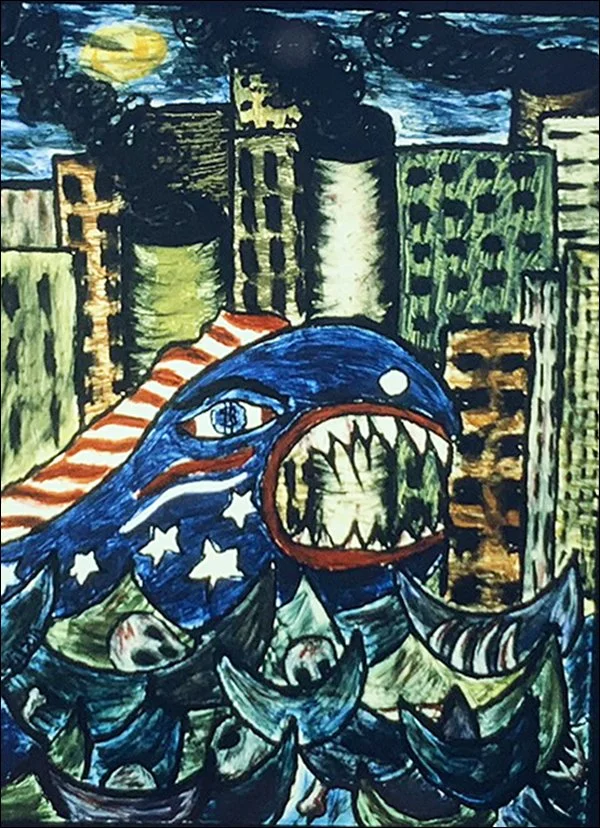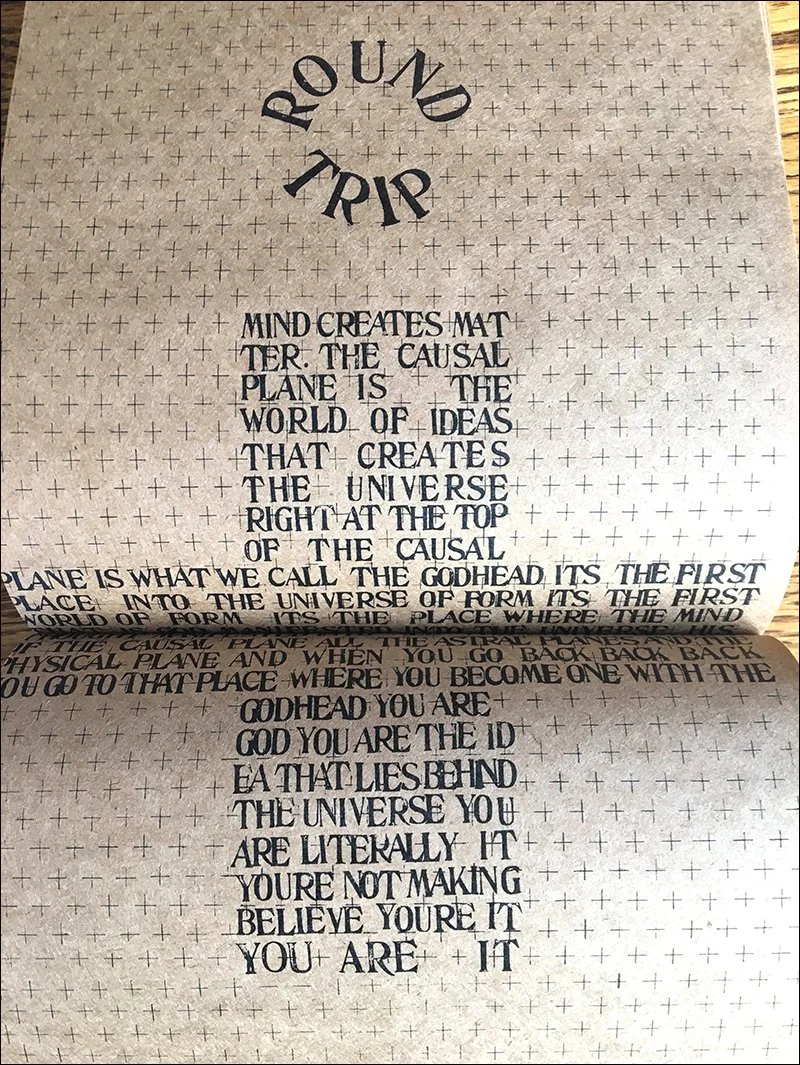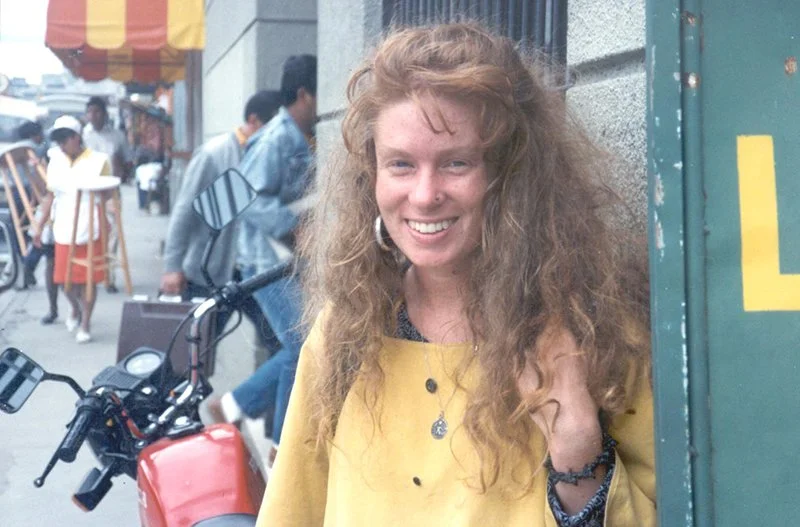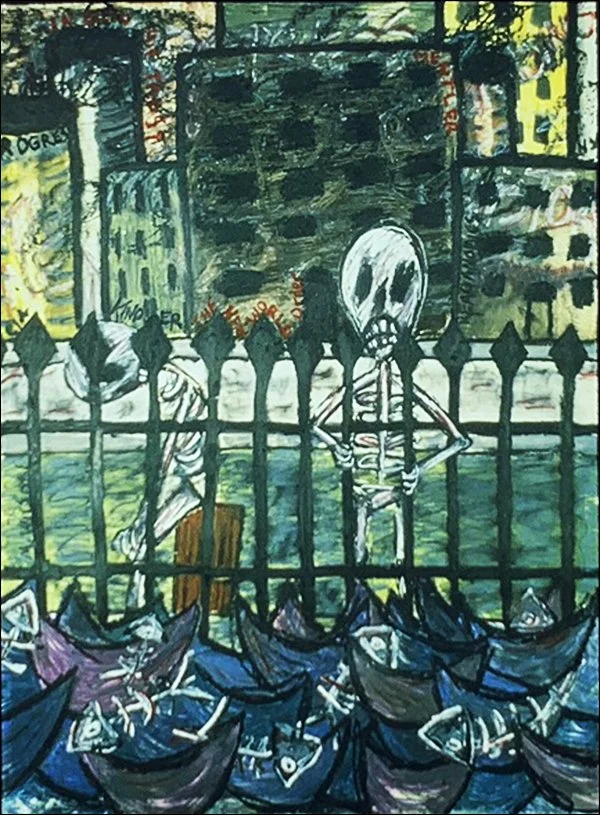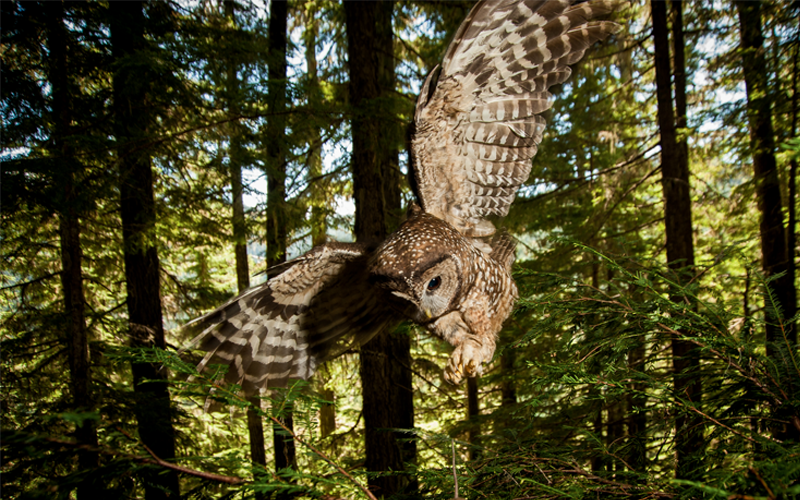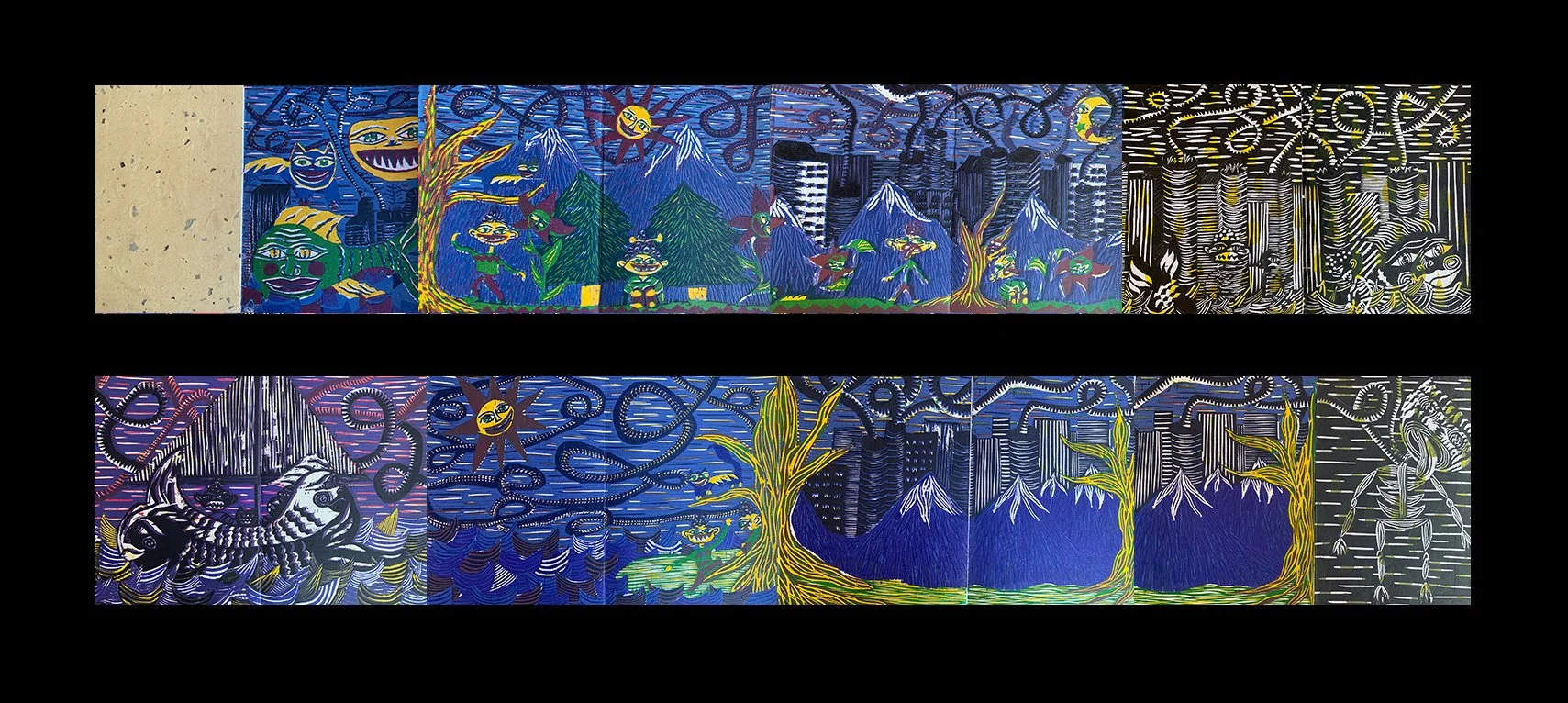Blah, Blah, Blah ...
Megan Wilson, My Country Til of Thee, monoprint, 26” x 36”, 1991
Overwhelmed.
It’s the experience and word that comes to mind and mouth when I’m asked, “How are you doing?”
I am overwhelmed, so overwhelmed.
What am I overwhelmed with? Sadness, fear, anxiety, despair, despondency … like I’m checking off the boxes on the Scantron forms used to document the crisis calls we’d receive at the Samaritans, the suicide prevention agency I worked at for two years in Boston in the early-mid nineties.
Am I feeling suicidal? No, and thankfully I do have people close to me who I can talk to when needed. However, I am struggling with these overwhelming feelings, as many of us are, accompanied by thoughts of inadequacy and guilt:
Why can’t I snap out of this? What’s wrong with me? There are so many others with much greater challenges. I have so many wonderful things going for me, I should feel blessed.
I do, and yet I can’t shake it, nor do I think I will anytime soon. The crux being that I know exactly why I can’t snap out of this, I know what’s wrong, I do have many wonderful things going for me and I do feel blessed.
The answer: most of the world is suffering – not just humans, all ecosystems – at the hands of a few people in positions of power and wealth. Everyday there are new accounts of extreme climate events - fires, tornadoes, hurricanes, earthquakes, heat, cold etc. - leading to displacement, poverty, climate refugees, and extinction. And everyday we hear new examples of the excessive wealth, gluttony and waste that is creating our climate crisis and unimaginable suffering - the billionaires’ race to space, the investment properties or multiple homes sitting unused for most of the year, the private jets and yachts etc. To understand what is happening and not feel sad, terrified, anxious, despairing, and despondent, is confounding. Even more so, to know that those who are creating this global crisis don’t care, believing they deserve to do whatever they want at whatever cost because they can and they have the money; further they assert that those who are struggling haven’t worked hard enough and/or haven’t made the right choices; therefore, that’s why they’re suffering. In truth what we’re talking about here is called gaslighting - those with power and money tell us this narrative to try and convince us this is truth, when in fact, it’s just another con game. It’s an extension of the con games used to establish this country in the first place.
Greta Thunberg summed it up well with her resounding blah, blah, blah in response to those who claim things are getting better and we’re moving in the right direction. No, systemically things, or rather, the vast majority of our ecosystems are not getting better and they’re moving in a direction that is alarming; and Thunberg was spot on with her follow-up statement:
We can no longer let the people in power decide what is politically possible. We can no longer let the people in power decide what hope is. Hope is not passive. Hope is not blah, blah, blah. Hope is telling the truth. Hope is taking action. And hope always comes from the people.
We are all inter-connected, hence the term ecosystem; and we are out-of-balance, creating significant and unnecessary suffering. Yet we have the solutions, and they’re not what those holding power and wealth try to lead us to believe they are.
Pages from Be Here Now by Ram Dass
As an undergrad at the University of Oregon in the early nineties I read the book Be Here Now by Ram Dass. The cult classic was my introduction to Buddhism and had a deep impact on me. While I loved the drawings and design, the content/concepts shook me – I was left feeling empty and grappling with a sense that nothing mattered. I questioned why I was working towards anything in school or in any part of my life. There was also a sense of elitism and privilege that seemed to go against the tenets it was putting forth. During this time, I worked at a bakery in Eugene; it was one in a long line of food service jobs I had, starting as a youth in Montana working at Arby’s when I was 14, Burger King at 16, followed by a sandwich shop, IHOP, a higher end restaurant called The Cellar, and a diner called Mom’s Pies, later in Oregon at a Chinese restaurant first, then Metropol Bakery.
The amount of waste we generated became overwhelming to me, especially when I began to think about how much was being created throughout the world daily and the billions upon billions of trash bags being dumped into landfills and oceans. Everything was so disposable … yet Be Here Now was telling me to let go of these thoughts … which was part of the elitism and irresponsibility I interpreted. The combination of those experiences led me into a deep depression that lasted for 6 months.
I began serving cookies, croissants, scones, etc. on the wax paper squares. If a customer asked for a plate or bag, I’d respond, “Do you really need that?” This practice got back to the owner, whose patience I’d already tested when I got my nose pierced and was almost fired over it (we came to an agreement I would only wear small studs). She took me aside and asked that I please stop questioning the customers. As with the nose ring, I held my ground and thankfully because I was a good worker and she liked me, she began purchasing recycled paper products, which was a relatively new practice for businesses at the time. It was a very small win.
Guatemala City, Guatemala, 1992
The summer after I graduated from U of O I traveled to Guatemala alone. I enrolled in a Spanish immersion program at Centro Lingüistico Maya, which included living with a family and with other students from the school. I was especially drawn to one of the other students living in the home I stayed. He was smart and funny; he’d done his undergrad at Wesleyan University and would be entering Harvard’s Kennedy School of Government in the fall. We’d have great conversations, but the one topic we’d debate most intensely was the environment. I believed it would be the greatest global challenge of our lifetimes and we would face an extreme crisis in the new millennium. He wasn’t concerned; believing that technology would counter all. While he was/is brilliant and was able to change my mind on some subjects, on this point I would not concede or bend even a little.
I note these experiences because here we are almost thirty years later, and the the horror I imagined for our future then, is now happening in real time. It’s not quite as bad as the dystopian landscape Octavia Butler envisioned for 2023 in Parable of the Sower, but it’s not that far off either, and we still have a year until we reach that date. Technology has not saved us, nor has taking small measures to placate those for whom we don’t want to offend by asking, “Do you really need that?” Because in essence that is the question we should be asking ourselves and those around us, especially those in positions of wealth and power, and it’s at the crux of the solution.
Megan Wilson, New World Order, monoprint, 26” x 36”, 1991
We can look to our nation’s history of Manifest Destiny, rooted in American exceptionalism and Western expansion to see the trajectory of how we got here. The ideas of constant growth, acquisition, control, extraction, and industrial innovation presented as a gift, packaged with a lining of white supremacy, misogyny, and ecocide, and delivered with the stamp of approval from the divine god of profit-above-all-else, better known as capitalism.
Thankfully there is a return policy. This defective product developed by the invisible hands of white men of privilege is not a gift at all, but rather a nuclear bomb that must be dismantled for humanity and much of life on earth to survive. The uncomfortable questions need to be asked of ourselves and others, especially those in positions of power:
Are we okay murdering millions of people and billions of animals each year to serve our consumptive practices? Are we okay living in a constant state of devastation and suffering, or knowing that our consumer wants are causing extreme suffering for others, two, four, six, eight or more legged? How do we continue living with the status quo knowing what lies ahead for those too young or unable to have a voice in the decisions that are currently guaranteeing they will live a life filled with devastation and suffering?
More importantly, we need the social and political will to change this course, which means we need to be honest with ourselves – yes, this is about keeping fossil fuels in the ground and supporting renewable energy, but ultimately it’s about facing the reality that we are currently consuming far more than we can regenerate or need. In 2021 we are using 1.7 earth’s worth of resources in a year. It’s unsustainable and ultimately will lead to more war, displacement, poverty, and death.
Northern spotted owl
I continue to try to be hopeful and to minimize my negative impacts as much as possible. Ironically, it was rereading Be Here Now and other texts like it, Buddhist and Wiccan, that led me out of my depression in college. By embracing impermanence and the practice of observing, breathing, and letting go, I could see things for what they were, not what I wanted them to be. I also understood the values of loving kindness and generosity as tools for creating positive change. Most critically I came to understand the practice of approaching life as a system of interconnected beings. I remember seeing a presentation at the Kennedy School of Government (I ended up in a five-year relationship with my housemate from my time in Guatemala – we’re still friends and I consider him family) by Lou Gold, an environmentalist and storyteller from Oregon, about the plight of the northern spotted owl.
In 1990 the northern spotted owl was listed as a threatened species under the Endangered Species Act throughout its range in northern California, Oregon, and Washington by the U.S. Fish and Wildlife Service, citing loss of old-growth habitat as the primary threat. The designation led to fierce battle between the logging industry and environmentalists. I attended many actions and protests in support of the owl and its habitat. In Gold’s presentation, he masterfully connected the dots to show the ripple of effects of losing the owl and how the impact of that loss would reverberate across plant and animal worlds, having a devastating effect on the entire ecosystem. Respecting and honoring these interconnected eco-systems is the only path that will save us. That’s a position that often gets bashed by those who live in that world of growth, acquisition, control, extraction, and industrial innovation, yet we only need observe our current reality to see it speaks truth to power. Sadly, there is absolutely nothing satisfying in the ability to say “I told you so” under these circumstances.
At some point there will be a shift, what exactly that means is hard to tell. It will be different for all of us. And the reality is it likely will get far worse before it ever gets better, meaning the extent of suffering will become significantly more extreme. This weekend the US was hit with a series of severe tornadoes across the southeast, the city of Mayfield, Kentucky especially devastated with over 100 people likely killed. At the same same time the super yacht industry is booming with more than 1,200 super yachts currently in the pipeline to be built, polluting and destroying the ecosystems of our oceans further; resulting in more land-based ecosystems being destroyed. And the cycle continues …
Megan Wilson, The Cycle of Humanity, woodcut book, 1990
